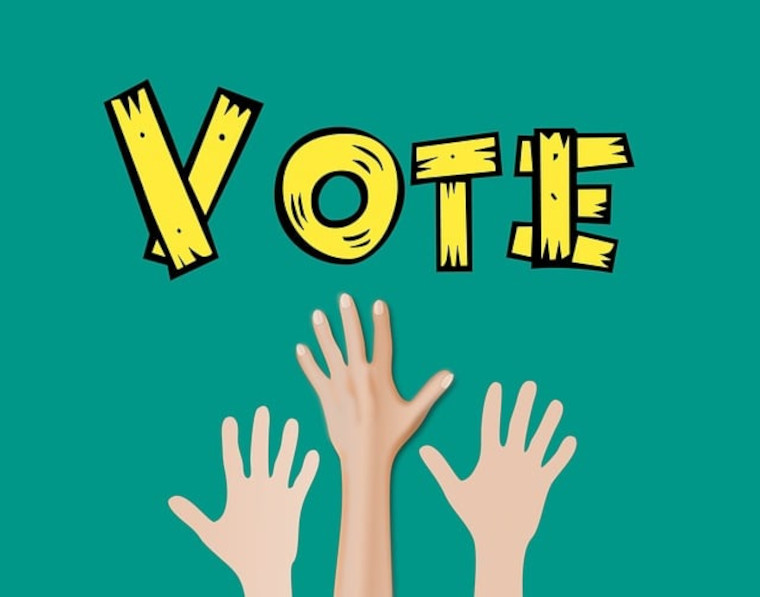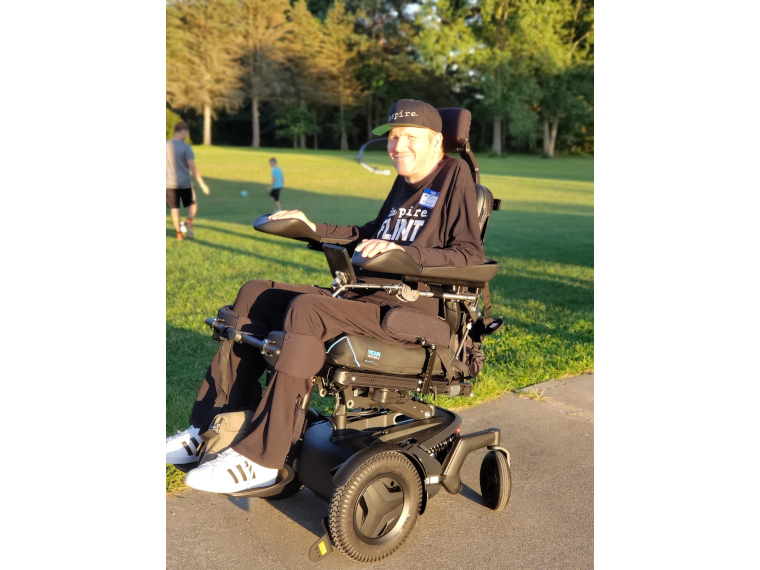Featured photo: Eric Patrick Thomas, provided by Eric Patrick Thomas
Written by Tanya Terry
According to census.gov, 20% of Flint residents under 65 live with a disability. The number is almost double the percentage of Michigan under 65 living with a disability, which is 10.2%.
While some other residents are not exercising their right to vote, Flint Resident Eric Patrick Thomas, who is disabled, has been fighting for his right to do so with great intensity.
Thomas, who uses a wheelchair, educates himself thoroughly before elections by visiting websites. He looks at the ballot using the Secretary of State’s website by typing in his voting information. Then, Thomas looks up articles about the candidates and proposals on the ballot. He looks up definitions if he reads something unclear. Thomas said he does this so he is not choosing candidates or voting on proposals that he’s not even familiar with.
After a significant injury, Thomas began allowing his caregiver to help him vote at the polls by pressing buttons for him.
“At first, I didn’t know my rights,” Thomas stated. “So, I would just go there and thought that’s how it was. But then I started learning my advocacy rights, that I have the right to vote private and independent with assistive technology that should be at the polling location.”
That’s when Thomas started speaking up.

Thomas is living with a spinal cord injury and is paralyzed from the neck down. He uses sip-and-puff assistive technology to control his wheelchair. Thomas told the Courier someone shot him in the neck on September 20, 1997, at his music release party.
Rachel Prevatt, voter engagement specialist for Disability Rights Michigan, explained how the sip-and-puff device works. It is a device that attaches most commonly to a power wheelchair for people who don’t have full use of their arms. The device allows individuals to operate their wheelchairs by blowing into a straw.
“They call it a sip-and-puff because breathing in on the device helps direct it,” Prevatt said. “A puff can be used not only to direct a wheelchair but also to operate computers and other devices,” Prevatt said. “One of the features of the voter assist terminals contracted by the state of Michigan is that they are compatible with the sip-puff-device. When a person uses a sip-and-puff, they can operate the VAT using that same technology when they come to the polls.”
Voter assist terminals, or VATS, can be used in many different ways. They have touch-screen capability. They can read ballots out loud, which can assist blind individuals or those living with visual impairments. It is also helpful for anyone with diminished literacy, according to Prevatt. She said if a person not living with a disability uses a VAT, they usually utilize its touch-screen capability.
Prevatt said Disability Rights Michigan receives several calls yearly from people asking for help. They want help ensuring that polling places are accessible or ensuring election workers receive appropriate training.
In Thomas’ case, he has been voting at the same precinct in Flint since June 2012. He has been voting at Eisenhower School. Yet even his in-person voting experiences have differed from year to year.
Thomas would see the same poll workers working at the polls for years. The workers would recognize him and tell him they did not have the proper assistive technology he was seeking. Although Thomas said he did not intend to get well-known at the polls, he is OK with it if the workers are getting familiar with the equipment and how to help him.
“I want to go there and vote and go, like everyone else,” Thomas stated.

Thomas created a series of YouTube videos to share his voting experience with others. The videos show Thomas leaving the polls disappointed because he could not vote privately and independently in 2016, 2017 and 2018.
“Eric first contacted us in 2018 in November about having difficulties with voting using the voter assist terminal, which is the accessible voting machine,” Prevatt stated. “We worked with him. My predecessor, Noah Walker, who was a voter engagement specialist before me, also worked with the City Clerk Inez Brown to make sure that they were aware of Eric’s needs and that they were prepared to meet his needs, as required by the law.”
In 2019, the proper equipment was in place for him to vote at his polling location. In addition, the City of Flint had trained a person to use the equipment. Thomas describes the experience as “awesome.” In a video, Thomas also says he became a licensed dealer for the company that makes the equipment to help ensure things would run smoothly for himself and others.
On October 23, 2020, Thomas revealed he used an accessible electronic absent vote ballot to vote remotely. The change was due to him being on bed rest at the time and due to the COVID-19 pandemic.
For the August 2022 primary, Thomas arrived at his polling location to find the machine he wanted so badly to use was still in the box. When opened, the straw-like tubing was missing. Thomas heard a voter ask a poll worker if he was the only one who used the machine. The poll worker said Thomas was the only one who used it. Yet, Thomas noted the VAT, or voter assist terminal, is not just for him.
“It was backward,” Thomas said. “It’s miseducating other voters about the equipment because everybody can use the VAT.”
“I’m not sure what happened or why it was an issue this year,” said Prevatt.
She said she hopes Thomas’s attention to the issue will remind the Flint City Clerk’s Office that this technology is essential and must be consistently available.
“Eric has been in contact with a number of different agencies and organizations,” Prevatt said. “He contacted the Bureau of Elections ADA ombud, a man named David Foster. We were notified that the Bureau of Elections Office went to Flint to train their election workers to ensure they were trained on the voter assist terminals. We are very hopeful that will make a difference.”
Prevatt pointed out Thomas also contacted the Department of Justice Eastern District of Michigan Office’s Disability Rights Division.
“They are aware of the situation, and I think they are observing to see how things proceed,” Prevatt said. “We’re very hopeful that Eric will be able to vote on Tuesday. We hope Flint will continue to do the hard work to ensure that all people with disabilities can vote.”
Thomas said he prefers to vote in person if he is able. He believes if he and others are not visibly using the VAT, municipalities will assume they don’t need to have the terminals available.
Thomas hopes everyone can vote privately and independently on Tuesday, November 8. He explained why voting is so important to him.
“It’s your voice,” Thomas said. “You’re having a voice at the table. You’re using your vote. This is democracy. You’re exercising it, just like anybody else. You did it. That’s it.”


